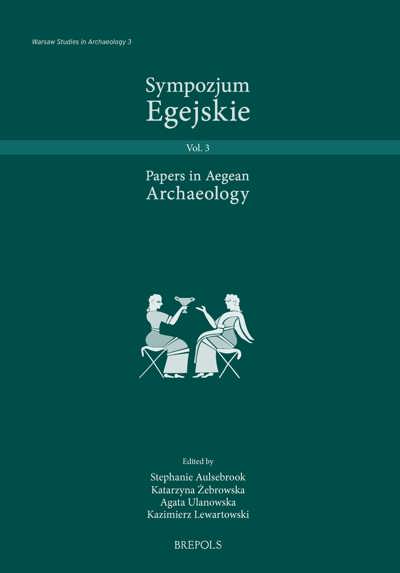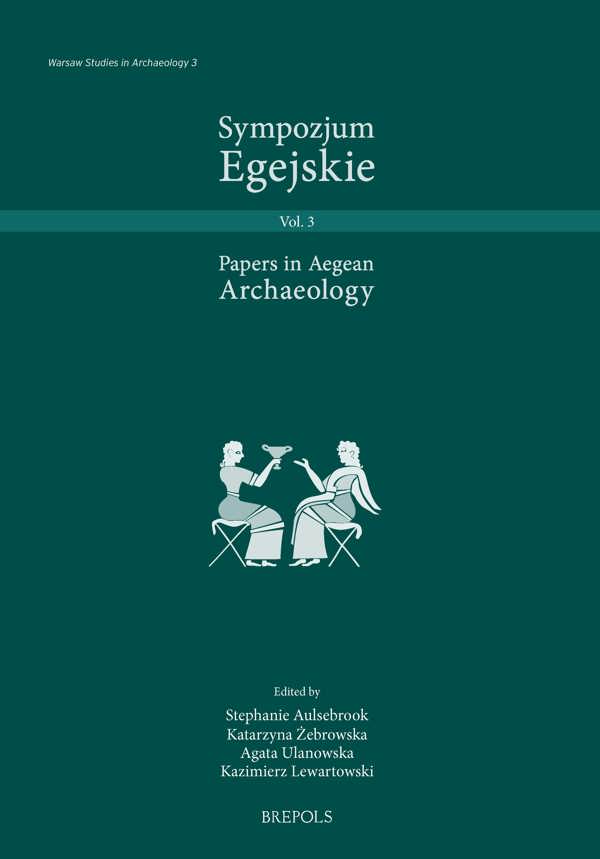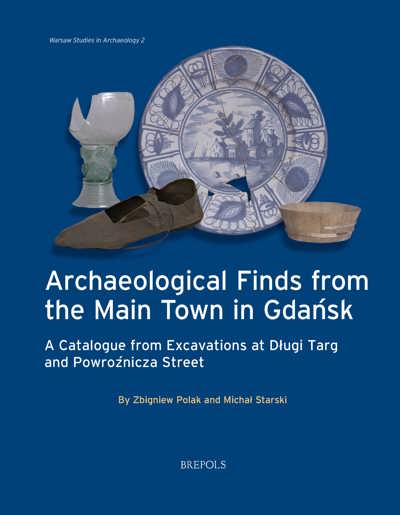
Sympozjum Egejskie
Papers in Aegean Archaeology 3
Stephanie Aulsebrook, Katarzyna Żebrowska, Agata Ulanowska, Kazimierz Lewartowski (eds)
- Pages: 223 p.
- Size:210 x 297 mm
- Illustrations:18 b/w, 46 col., 6 tables b/w., 2 tables col., 1 maps b/w, 6 maps color
- Language(s):English
- Publication Year:2022
- € 50,00 EXCL. VAT RETAIL PRICE
- ISBN: 978-2-503-59991-5
- Paperback
- Available
- ISBN: 978-2-503-59992-2
- E-book
- Available
This third volume in the Sympozjum Egejskie: Papers in Aegean Archaeology series showcases sixteen further peer-reviewed papers on diverse themes from early career researchers working at the cutting-edge of studies on the prehistoric Aegean, and provides an invaluable insight into the state of the discipline and its future direction.
Stephanie Aulsebrook is an Assistant Professor at the Faculty of Archaeology, University of Warsaw. She specialises in the Late Bronze Age metallurgy of Greece and the social role of metals in Mycenaean societies, especially at the site of Mycenae itself.
Katarzyna Żebrowska is a PhD candidate at the Faculty of Archaeology, University of Warsaw. She specialises in Italo-Aegean contacts, Aegean influences on Sicilian cultures, and funerary architecture, especially in relation to landscape, as well as textile archaeology, in particular the functionality of textile tools.
Agata Ulanowska is an Assistant Professor at the Faculty of Archaeology, University of Warsaw. She specialises in textile archaeology, specifically textile production, weaving technology and the functionality of textile tools, Aegean seals and sealing practices in relation to textile production, as well as experimental and experiential archaeology.
Kazimierz Lewartowski is a Professor at the Faculty of Archaeology, University of Warsaw. He specialises in Mycenaean archaeology with an emphasis on Mycenaean burial customs but currently his interests focus on the memory of the past among the Archaic and Classical Greeks.
Sympozjum Egejskie: Papers in Aegean Archaeology is a peer-reviewed sub-series of Warsaw Studies in Archaeology. It has been designed to fulfil the role of a platform for presenting and introducing a wide range of new research approaches and themes within the broad area of Aegean Archaeology. This is primarily achieved through showcasing the work of newcomers to the discipline, in other words those scholars who are currently at the beginning of their research career in the field of Aegean Archaeology, as well as scholars working outside the traditional university structure such as independent scholars, professional field archaeologists, museum curators, and conservators. It is our hope that this series will serve as a concise guide to the most recent research undertaken by early career scholars and the diverse and inspiring new trends in the archaeology of the Prehistoric Aegean, as well as shining a light on the future direction of the discipline.
Introduction by the editors Stephanie Aulsebrook, Katarzyna Żebrowska, Agata Ulanowska, Kazimierz Lewartowski; University of Warsaw
1. Epidemic, Infectious and Parasitic Diseases in Prehistoric Greece (Tomáš Alušík; Charles University)
2. Perforated Furnace Mettalurgy in the Final Neolithic Aegean. New Archaeological Evidence from the Acropolis of Athens and Preliminary Observations from other Contemporary Sites (Vasiliki Eleni Dimitriou; National and Kapodistrian University of Athens)
3. The “Emblems" on the Jugs in the Late Prepalatial Ayia Triada Necropolis and the Iconography of Seals: A Comparison (Chiara De Gregorio; Heidelberg University)
4. Birdcage Vases (Vasi a Gabbietta) from Protopalatial Phaistos (Crete) in Context. A Note on an Enigmatic Vase (Valeria Taglieri; Ca’ Foscari University of Venice)
5. At the Roots of Production. The Kouris Valley (Cyprus) as a Bronze Age 'Textile Environment' (C. 2200–1400 BCE) (Giulia Muti, Giulia Albertazzi; Independent Researcher; Università degli Studi di Venezia, Udine, e Trieste)
6. Building a Minoan Larnax: Techniques, Gestures and Craftsmanship. Preliminary Results (Sarah Georgel-Debedde; Université de Paris 1 Panthéon-Sorbonne)
7. Problematising Peak Sanctuaries. Should Differences Make a Difference? (Jan Sienkiewicz; University of Cambridge)
8. Forcing Ahead or Foiled Again? The Application of Cross-Craft Analysis to Late Bronze Age Metal Working in the Aegean (Stephanie Aulsebrook; University of Warsaw)
9. Pictorial Style and Mycenaean Wall Paintings: Two Distinct Art Forms (Sofia Antonello; Ca’ Foscari University of Venice)
10. Practices for Adverting Evil and the Notion of Ritual Protection in Mycenaean Cult Performance (Christina Aamodt; Independent Researcher)
11. Reassessing a Peripheral Geopolitical Vacuum: The Case for a Mycenaean Palace-State in the Spercheios Valley Region (Christofilis Maggidis, Efi Karantzali, Adrianos Psychas; Mycenaean Foundation; Ephorate of Antiquities of Phthiotida & Eurytania; University of Athens)
12. All's Well that Ends Well: An In-Depth Look at how Objects Entered Aegean Late Bronze Age Wells (Stephanie Aulsebrook; University of Warsaw)
13. Investigating the 'Peripheral' Mycenaean Community: Preliminary Results of the Bioarchaeological Study of the Late Helladic III Kallithea-Rampantania Cemetery, Achaea, Peloponnese, Greece (Maria Katsimicha, Ioanna Moutafi, Tina Jakob; The University of Manchester; Malcolm H. Wiener Laboratory for Archaeological Science of the American School of Classical Studies at Athens; Durham University
14. Funerary Places in East Crete: The Case of the LM III Cemetery of Mysini-Aspopilia, Siteia (Maria Psallida; National and Kapodistrian University of Athens)
15. Changes in Religious Ritual in Mycenaean Greece. Communicative Memory and the Postpalatial Period (Ulrike Berndt; Independent Researcher)
16. Between Heritage Preservation and Public Appreciation: Re-evaluating Reburial Strategies (Thérèse Claeys; UCLouvain)




